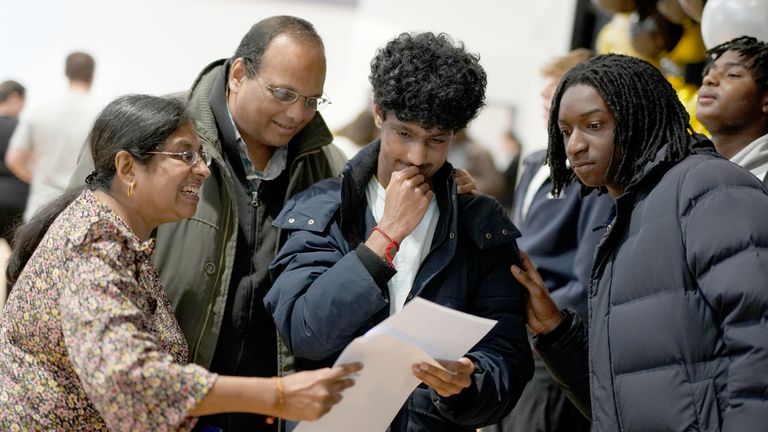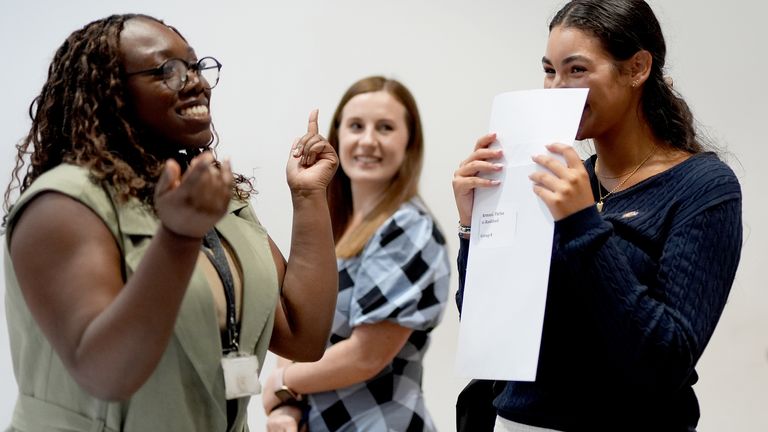Hundreds of thousands of teenagers have received their GCSE results with a slight drop in the proportion of top grades awarded from last year.
The approach to grading in England returned to pre-pandemic levels last year and this year exam regulators in Wales and Northern Ireland have also made the transition.
The Joint Council for Qualifications (JCQ) said the number of result is the biggest ever across the three nations with more than 6.5 million issued across GCSEs as well as Level 1 and 2 vocational and technical qualifications (VTQs).
Follow politics live updates: Starmer's son among students getting GCSE results
The GCSE results are similar to last year, with more than a fifth of entries, or 21.8%, awarded the top grades - at least a 7 or A grade - slightly down on the 22% in 2023, but higher than the 20.8% in 2019 before the pandemic.
Some 67.6% of grades were awarded at 4 or C and above, which is considered the standard pass grade, compared with 68.2% in 2023 and 67.3% in 2019.
The proportion getting a grade 1 or G or above is 97.9%, down from 98% in 2023 and 98.3% in 2019.
While traditional A* to G grades are used in Northern Ireland and Wales, in England these have been replaced with a 9-1 system, where 9 is the highest.
A 4 is broadly equivalent to a C grade, and a 7 is broadly equivalent to an A.
GCSE entries increased by 4.8% to more than 6.1 million, resulting in just over 50,000 more top grades being awarded than last year.
Prime Minister Sir Keir Starmer said in a post on X: "Congratulations to those receiving their GCSE results today - you've done an incredible job.
"I know the power of education and opportunity. My government will make sure everyone's path is determined by their talent, skills and ambition, not where you come from."

Pandemic disruption
Education disruption due to COVID-19 led to an increase in top GCSE and A-level grades in 2020 and 2021, with results based on teacher assessments instead of exams.
Last week, the proportion of A-level entries awarded top grades rose on last year and surpassed pre-pandemic highs.
Many of the pupils who are receiving their GCSE results were in Year 7 when schools closed due to the pandemic.
Leaders in the education sector have warned that the cohort has had to overcome a series of challenges in their secondary schooling in recent years.

Read more from Sky News:
Bodies recovered from sunken yacht
Man arrested over delivery driver murder
Entries from students aged 17 and over were up 20.5%, with many thought to be re-taking exams as standards returned to pre-pandemic levels.
Results remain higher for girls than boys, but the gap narrowed slightly, while the top ten most popular subjects remain the same as last year, with science double award staying top with a total of 980,786 entries.
Maths remains the second most popular subject followed by English language while, outside the top ten, business studies moved from the 14th most popular subject to the 12th with an increase of 9.7%.

'Deeply concerned' about inequalities
Schools minister Catherine McKinnell said: "I want to congratulate both students and teachers on their achievements today despite the many challenges they've had to overcome over the past few years to get here.
Keep up with all the latest news from the UK and around the world by following Sky News
Tap here"While this is a moment to celebrate, I am deeply concerned about the inequalities in our education system with where you live and what type of school you attend still being too big an influence on your opportunities."
Figures from exams regulator Ofqual show the attainment gap in GCSE results between private and state schools in England has widened at the top grades this year.
Nearly half (48.4%) of private school entries scored a grade 7 and above compared to 19.4% of those at comprehensive schools - a gap of 29 percentage points, up from 28.2 percentage points last year.
Figures from JCQ show that London and the South East remain ahead in top grades compared to other regions of England, with more than a quarter of entries scoring at least a grade 7 (London 28.5%, South East 24.7%).
At the other end of the table, the North East has the lowest proportion, with 17.8% of entries scoring at least a grade 7.
The gulf between London and the North East has closed marginally to 10.7 percentage points this year from 10.8 percentage points last year.
Disclaimer: The copyright of this article belongs to the original author. Reposting this article is solely for the purpose of information dissemination and does not constitute any investment advice. If there is any infringement, please contact us immediately. We will make corrections or deletions as necessary. Thank you.



